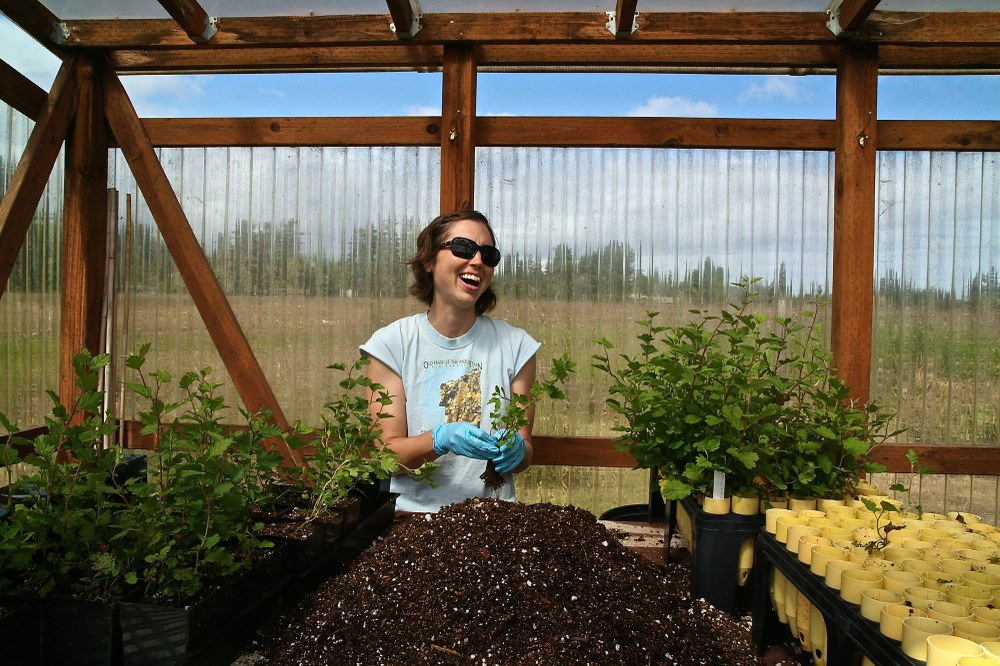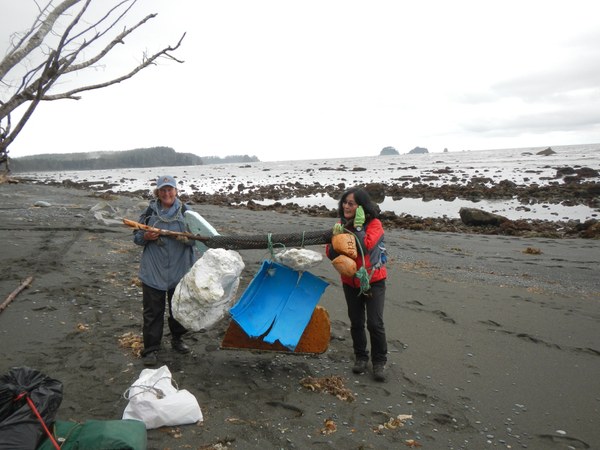
There's something about digging in the dirt. I always know my kid's had an especially good day when he’s in outfit number three or there's dirt in his ears. As adults, or even young adults, our dirt ‘play’ changes significantly. I hike and climb and get dirty that way for sure, but there's something about getting dirt under-the-nails through good, old-fashioned dirt digging and rock moving. I started participating in trail-work events as a way to give back to the places I played. And kept doing it in part because it because it was so satisfying to see what impact a group of volunteers could make in a day’s work, and in part because it continues to be… simply fun.
The Mountaineers approaches our conservation work through education, stewardship and advocacy. We work to build bridges between our love of the places we play and the need to protect them. Our programs work in concert to build a conservation community that spans from first-time hikers to third-term senators. We also believe it's our duty to give back to our wild places: from beach cleanups to maintaining some of Washington’s historic fire lookouts, our volunteer-driven stewardship program, is one of the most dramatic ways our members say, “this place matters!”
Long-time Mountaineer, Bruce Wolverton, shares why he gives so much of his time to the Everett Branch’s stewardship work:
“Partnering on National Trails Day and trail stewardship programs is extremely rewarding, even more so when you're working on lookouts such as Mount Pilchuck or the Three Fingers Fire lookout. When we do trail maintenance on the hike up to Mt. Pilchuck Fire lookout, we normally take plastic garbage bags and as other hikers pass us on the trail and see us cleaning up the area, it becomes very contagious for them to want to help out. Now, we always take extra garbage bags, so we can share with other hikers who want to jump in. I've never had to carry a garbage bag out of the mountain yet as the other hikers are so helpful.”
The Everett Branch has a long history in maintaining historic lookouts here in Washington. For example, at the request of the Darrington Ranger District of the US Forest Service, the Everett Lookout and Trail Maintenance committee was formed in 1985, officially taking over routine maintenance of the Three Fingers Lookout. Outdoor enthusiast Gwen Tollefson shares a bit on what ‘re-roofing the top of the world’ with our Everett branch can look like:
“In 2015, the Three Fingers Lookout’s roof needed to be replaced. “The helicopter airlift of supplies to this remote was the absolute crux of the project. Without it, an estimated 100 individual trips would have had to have been made to carry it all. That means, 100 pairs of boots traveling a heavily eroded trail, 100 people spending nights camping in an environmentally fragile area, 100 trips up a steep, icy snowfield and through a class 3 rock scramble, 100 ascents of the three precariously placed ladders followed by the tilted rock slab that leads to the front porch of the lookout, 100 opportunities for something to go wrong that could cause damage to property or, worse, injury to a volunteer. Instead, the lift went off without a hitch and the load was neatly delivered to the preferred location on the back porch. With this first task easily accomplished, the crew was able to set about other routine maintenance tasks – replacing broken window panes and failing hardware, painting and, as always, cleaning up other people’s trash.”
In the end, it took over 400 hours of volunteer-only labor to re-roof the Three Fingers Lookout in 2015. Gwen asks all of us to remember, “Whenever you are lucky enough to encounter an old fire lookout, please remember what it takes to look after these special places. Sign only the logbook, clean up after yourself, pack out your trash, and leave nothing behind. Oh, and volunteer whenever and wherever you can.”
While our Everett Branch has a long history of trail and lookout stewardship in the Darrington area, many of our other branches engage in stewardship as a core part of their Mountaineers experience.
Kathy Fox shares her passion for the work she’s lead for our Olympia Branch on the Olympia Peninsula:
“June 2014 marked our first stewardship trip in support of Elwha River restoration. We volunteered at the nursery on Friday, followed by a presentation on the history of the Elwha River by Olympic National Park Ranger Dean Butterworth. Afterwards, we enjoyed pizza at the evolving mouth of the river where it empties into the Strait of Juan de Fuca, and camped at the Altair Campground in the Elwha Valley of the Park. Our adventure on Saturday included a hike in the Geyser Valley, then onto a fascinating walk amongst old growth stumps that were revealed in what once was Lake Aldwell before the Elwha dam was removed. There were four of us on that first trip to the Elwha and the roster has grown with each trip since. As the restoration project will be completed at the end of this winter 2017, are leading our ninth and final trip to plant trees along the river this January.”
Kathy also shares that for her, “Any opportunity to be in the company of people energized to give back to the resources we all enjoy is motivation in the highest sense for me. The positive energy that we feed each other when on a stewardship activity is the best medicine for anything that’s ailing me.” Yup, there’s something about getting dirt under the fingernails.
The sea kayakers from our Kitsap branch have stewarded Washington’s coastlines for years. Vern Brown has led our partnership with Washington Coast Savers beach cleanups since 2007, and expanded their reach in 2012 with Friends of Olympic National Park, focusing on Duk Point beaches in the spring and the beaches of the Ozette Triangle in the fall. A favorite memory of Vern’s includes two volunteers, one who was just shy of 80-year’s old and another who was 17 at the time. 17-year old Patrick pulled and carried two wheels two miles from where they found them on the beach. “Note that Joan, our 80-year old, would have carried the tires out herself if Patrick hadn’t been so instant that the tires were his find.” So much of the trash that these volunteers haul off the beaches every year – ropes, wires and the like, are not only eye sores, but can also pose significant threats to wildlife. Our Kitsap members are proud to give back to the places we love, and the animals that call these places home.
 Mountaineers Kitsap volunteers, Linda and Michiko help gather trash for Washington Coast Savers Beach Cleanup. Photo courtesy of The Mountaineers.
Mountaineers Kitsap volunteers, Linda and Michiko help gather trash for Washington Coast Savers Beach Cleanup. Photo courtesy of The Mountaineers.
Partnerships like these are crucial to all of The Mountaineers conservation work. From decades-old partnerships with land managers like the Darrington Ranger District or our National Parks, all projects we undertake are either coplanned with the land manager, or done with their expressed approval. Partnerships with other conservation and recreation organizations are also pivotal to our success.
My first experience with trail building was with the Access Fund, and much of The Mountaineers climbing-related stewardship is with the Access Fund and Washington Climbers Coalition. We've developed a partnership with the Mountains to Sound Greenway, as the I-90 Corridor is where so many of us hike, climb, backpack and ski. We've also worked to partner on closer-to-home stewardship opportunities at local parks and greenspaces, which is perfect for school and youth groups. And many Mountaineers also volunteer with Washington Trails Association, which they can receive stewardship credit for — a requirement to graduate many of our courses . But no matter where you volunteer, it's all for the same cause — helping the environment and protecting the places we love to play.
Want to learn how to advocate for the places where we play? Take the Outdoor Advocates Network eLearning course Protecting Public Lands 101 and start engaging in advocacy efforts today! Mountaineers members can access the course here and earn their Public Lands Conservation 101 badge. Non-members can access all of the same information here.
 Katherine Hollis
Katherine Hollis